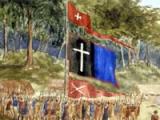1864 Pai Marire ambush in Taranaki
A British patrol was ambushed by Pai Marire warriors near the present-day township of Oakura, south-west of New Plymouth. Seven soldiers were killed and 12 wounded. Those killed were decapitated and their heads were carried by Pai Marire disciples from tribe to tribe to enlist recruits.
Pai Marire had emerged in 1862 in response to the conflict over land in Taranaki. Its founder, Te Ua Haumene, based the new religion on the principle of pai marire – goodness and peace. He called his church Hauhau: Te Hau (the breath of God) carried the news of deliverance to the faithful. The terms Pai Marire and Hauhau became interchangeable as labels for those who followed this religion. Against a backdrop of war and land confiscations, the founding principle of Pai Marire was often subverted by violent elements, as in the case of the Oakura ambush.
In the minds of most Europeans, Pai Marire was synonymous with violence, fanaticism and barbarism. They saw it as a fundamentally anti-European religion. Many Maori also opposed the movement, fearing that it would undermine the sovereignty of iwi. From 1865 to the early 1870s conflict raged on the east coast of the North Island between pro- and anti-Pai Marire factions within Ngati Porou.















